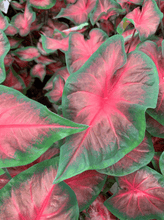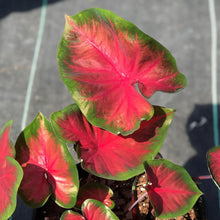The fancy-leaved Caladium Royal Flush has deep pink-to-red leaves with a green border. It's a tuberous plant belonging to the Araceae family. This ornamental aroid is often cultivated in containers or as a border plant.
General Caladium Info
- Scientific name: Caladium x hortulanum Royal Flush
- Ships as: Bulb/tuber
- Bulb size: 1
- Plant Type: Herb
- Life Cycle: Perennial
- Light Requirements: part to full sun
- Soil pH Preferences: Slightly acidic (6.1 – 6.5) to Neutral (6.6 – 7.3)
- Maximum Recommended Zone: Zone 13
- Other Info: Deer and rabbit resistant
- Warning: Toxic to cats and dogs
Growing Tips
- Light, Heat, and Humidity: Caladiums require ample light, heat, and humidity for optimal growth. Ensure they are planted in a bright spot with sufficient warmth and humidity.
- Starting Your Bulbs: Plant bulbs about 2" deep with eyes facing up, 8-12" apart, in a shallow container with good drainage. Keep the pot in a bright location.
- Watering: Water generously after planting and maintain slightly damp soil. Roots and sprouts will form in a few weeks.
- Soil: Use a mix of houseplant potting soil, combined with heather soil, perlite, sphagnum moss, or compressed coconut fiber for optimal growth.
Caring for Your Caladium
- Patience: Be patient for growth to appear, typically within a few weeks. Once leaves unfold, repot into a larger pot with the well-draining substrate.
- Light needs: Caladiums enjoy sun, and bright indirect light enhances the vibrancy of the colors.
- Humidity: Caladiums love humid conditions. Consider using a humidifier or spraying foliage with filtered water. This helps keep the colors vibrant.
- Fertilizer: During growth, apply diluted liquid fertilizer for indoor plants, avoiding contact with leaves.
- Long-term care: It can be grown in the garden or indoors as a houseplant on a veranda or bright windowsill.
- Pruning: Trimming back the leaves is not necessary.
Elephant ears winter care
- Preparing for Dormancy: As autumn ends, reduce watering gradually. Once foliage wilts completely, cut down stems, and dig up bulbs. Air dry before storing in a dark, well-ventilated, dry place above 15°C.




